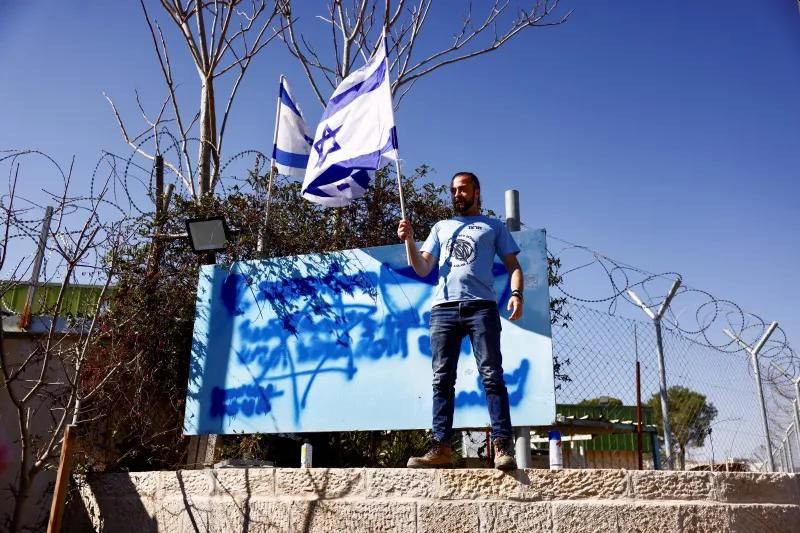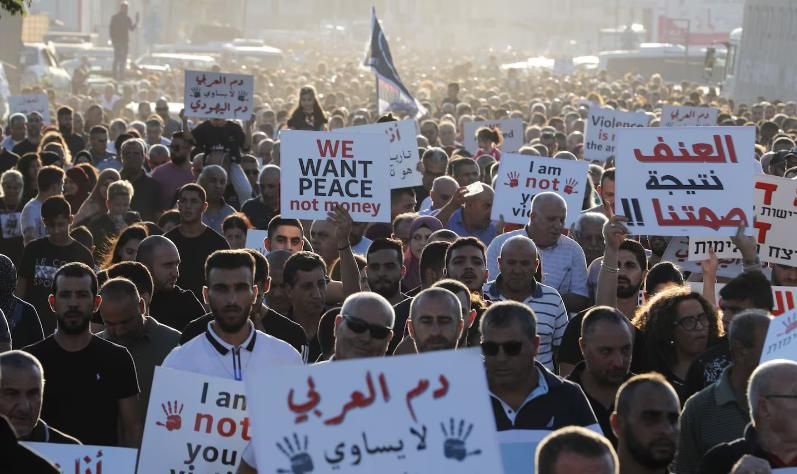By Eric Vandenbroeck and co-workers
All people born in
British Mandatory Palestine between 1923 and 1948 (today's Israel) had
"Palestine" stamped on their passports at the time. But when they
were called Palestinians, the Arabs were offended. They complained: "We
are not Palestinians, we are Arabs. The
Palestinians are the Jews". Given the situation
today, International institutions, including the EU and the United
Nations, should demand that Israel uphold international law on minority
rights. If Israel refuses to reverse its latest anti-Arab laws and continues turning
a blind eye to Jewish Israeli extremism, these organizations should urge
international, economic, and academic institutions connected to Israel to make
their relationship with Israel contingent on the protection of Palestinian
citizens. The Other War on Palestinians.
Since the Hamas
attacks of October 7, 2023, and the ensuing Israeli
war on Gaza, the plight of Palestinians in the occupied territories has rightfully
attracted the attention of observers in the Middle East and beyond. Lost in
these discussions, however, is the fate of Palestinian citizens of Israel, who
make up about 16 percent of the total Palestinian population and around 20
percent of Israel’s population. They occupy a unique position in Israeli
society. By their Israeli citizenship, they enjoy more rights than Palestinians
in the occupied territories. But because of their Palestinian identity, they
are confined to second-class citizenship by laws enshrining the country’s
Jewish character and by discriminatory practices intended to prevent them from
achieving equality with Jewish Israelis.
Palestinian citizens
of Israel have always endured de jure and de facto discrimination, living in
largely segregated communities with limited access to state resources.
Their political parties have navigated the limits of participation in a system
built on the ethnopolitical supremacy of Jewish Israelis, advocating in the
Knesset for equality, civil rights, and greater government investment in Arab
communities. But since the outbreak of the war in Gaza, their place in Israeli
society has become increasingly untenable. As Jewish Israelis have lurched
further to the right, their Palestinian fellow citizens have faced
unprecedented levels of persecution and abuse from an Israeli government that
includes overt Jewish supremacists. Jewish Israelis are increasingly rejecting
the uneasy coexistence of pre–October 7 Israeli society, leading to more
explicit calls to revoke the citizenship of Palestinian citizens and expel them
from Israel. This turn has made it even more difficult for Palestinian
political parties to operate within Israeli politics, where they already face
significant constraints.
Same as it Was
In recent decades,
despite the backdrop of increasing suppression by the Israeli government
following Prime Minister Benjamin Netanyahu’s return to government in 2009,
Palestinian citizens of Israel had made meaningful if incomplete progress:
reducing the earnings gap with Jewish Israelis, fighting to address the
systemic underfunding of Arab communities, and becoming a powerful force in the
Knesset following the creation of the Joint List, a bloc of the four main Arab
parties, in 2015. But these successes were short-lived.
The Joint List
attempted to integrate more deeply into Israeli politics and gain access to
decision-making circles by supporting centrist Benny Gantz for prime minister
and engaging in negotiations to support a government coalition opposing the
right. However, its efforts were ultimately thwarted by the center-left camp in
Israel after Gantz decided to form a coalition with Netanyahu rather than a
government supported by the Arab parties. The dissolution of the Joint List in
2022 led to a more polarized Arab vote and an overall decline in Arab voter
turnout and left the insecure position of Palestinian citizens of Israel
unresolved.
The declaration of a
state of war in Israel in October 2023 and the start of Israeli military
operations in Gaza shortly after heralded a fundamental shift in this already
precarious status. The Israeli government launched an unprecedented campaign of
persecution and intimidation against Palestinian citizens of Israel, seen as a
“fifth column” of internal enemies who threatened the safety of Jewish
Israelis. Political figures, such as the far-right National Security Minister
Itamar Ben-Gvir, Knesset members, and other public officials, issued calls for
the surveillance and, in some cases, expulsion of Palestinian citizens. Kobi
Shabtai, then Commissioner of the Israel Police, declared a total ban on
anti-war protests in Arab towns and villages in Israel. The prohibition, which
did not apply to Jewish Israelis, remained in effect until March 2024.
The days following October 7
The Israeli police
also began monitoring the social media accounts of Palestinian citizens for
expressions of sympathy for the suffering of Gazans, as well as what it deemed
to be support for Hamas. The dragnet ensnared hundreds of
Palestinian citizens, particularly activists and social media
influencers targeted by the newly created Task Force for Monitoring
Incitement Online, overseen by Ben-Gvir to track down critics of the official
Israeli position on the war.

The days following
October 7 saw a wave of arrests targeting dozens of Palestinian citizens of
Israel, in some cases merely for posting images of children in Gaza or
expressing their opposition to the war. The popular singer Dalal Abu Amneh
was detained and accused of “incitement” for sharing a social media post that
read, “There is no victor except God.” An Arab standup comedian was arrested
for writing “The eye weeps for the residents of Gaza” in an Instagram post.
These high-profile arrests have created an atmosphere of relative silence that
has prevailed among Palestinian citizens in the 18 months since Israel’s ground
invasion began. From October 2023 to May 2024, police indicted more than 150
Palestinian citizens for incitement to terror; no Jewish Israelis were indicted
for incitement to racism or calling for genocide, both of which are considered
crimes under Israeli law.
The Israeli
government, with its coalition of hard-right members, including Ben-Gvir and
Finance Minister Bezalel Smotrich, seized the opportunity to advance its vision
for an Israel free of Palestinians. It has used the pretext of the state of
emergency to enact new anti-democratic and anti-Arab laws targeting the
citizenship of Palestinian Israelis. A law passed in November 2023 grants
Israeli authorities the power to revoke the citizenship of and deport relatives
of those convicted of committing or supporting terrorism, charges that are
almost exclusively applied to Palestinians. The government has also
proposed a law that aims to impose further limits on the political
representation of Palestinian citizens in the Knesset and on their
participation in local elections. Several Jewish Israeli municipal leaders and
the mayors of several cities have closed down or restricted access to
construction sites to prevent Palestinian citizen workers from accessing them,
effectively choosing not to build in their communities to not interact with
Palestinian citizens of Israel.
No Room to Maneuver
Scarred by the shock
of Hamas’s attack and seeking vengeance, sections of Israeli civil society have
engaged in attacks on the civil liberties of Palestinian citizens. Israeli
universities, which market themselves as liberal institutions dedicated to equality
and diversity and in some cases have partnerships with Western universities,
monitored their Palestinian students, suspending some from their courses and,
in a few cases, even filing police complaints against them for expressing their
opposition to the war or solidarity with Gazans under Israeli bombardment.
Israeli high academic institutions have punished 160 Palestinian students for
antiwar social media posts, including by suspending or expelling some, but have
disciplined few, if any, Jewish Israeli students for racism against
Palestinians.
The targeting of
Palestinian citizens of Israel has not been limited to students: In March 2024,
the Hebrew University of Jerusalem suspended the Palestinian scholar Nadera
Shalhoub-Kevorkian after she accused Israel of committing genocide in Gaza,
comments for which she was arrested and detained; the university then pressured
her to resign. Violent racially motivated attacks on Palestinian
citizens have also become more common, the most notable among them an incident
in which a mob chanting “Death to Arabs!” trapped Arab students at the Netanya
Academic College in their dormitories in October 2023.
Palestinian citizens’
leadership, accustomed to working within the confines of Israeli society, has
been forced to confront unprecedented limits on political activity. The High
Follow-Up Committee for Arab Citizens of Israel, the public body that represents
Palestinian citizens of Israel, voiced its opposition to the war by organizing
several demonstrations against it, though they were only permitted many months
after the war began and faced many limitations. The committee also provided
support to civil society organizations in their efforts to combat persecution
in the labor market, academia, and the broader public sphere.
Meanwhile, Arab
parties and their representatives in the Knesset have resumed protests against
the war within the halls of parliament and in the streets. But these measures
pale in comparison to prewar activism. Israel’s criminalization of opposition
to the war has created an atmosphere of widespread fear. Even as activism ramps
back up among Palestinian citizens and their political leadership, the chilling
effect of Israeli policies and violence has foreclosed the possibility of mass
mobilization. Palestinian politics in Israel remains paralyzed, with no obvious
domestic solution to the enduring discrimination or its latest intensification
on the horizon.

Duty to Protect
The latest wave of
persecution reflects the increase in anti-Palestinian attitudes among Jewish
Israelis that tracks with the country’s rightward shift and long predates the
war in Gaza. The impunity with which Israeli lawmakers and right-wing Jewish
Israelis have targeted Palestinian citizens of Israel has been enabled by the
mainstreaming of anti-Palestinian prejudice in Israeli society. According to an
Israel Democracy Institute poll from 2022, 49 percent of Jewish Israelis
believe that they should have more rights than non-Jewish citizens, and 79
percent of the total Jewish population in the country opposes including Arab
parties in Israeli government coalitions and appointing Arab ministers to
government positions. The war has only increased the prevalence of such
attitudes.
Surveys conducted by
the Israel Democracy Institute between September 2024 and February 2025 reveal
that the majority of Jewish Israelis do not think the Israeli army is
committing war crimes or acting immorally in Gaza, and 83 percent believe that
its conduct during the war has been ethical. Over 73 percent of Jewish Israelis
have said that they support Trump’s deportation plan for Palestinians from
Gaza.
As a result,
Palestinian citizens of Israel cannot rely on the Israeli government to protect
them. They should, of course, continue to organize by building institutions,
strengthening grassroots initiatives and community solidarity, and
participating, to the extent possible, in Israeli civil society. They should
also deepen their tactical and strategic partnerships with Jewish Israelis
dedicated to fighting for democracy and against Jewish ethnic supremacy in
Israel. But they need help from outside, as well.
Arab states better
renew their engagement with Palestinian citizens of Israel after decades of
isolation and disconnection by amplifying their voices in international forums,
supporting their cultural and educational institutions, and, for
those Arab countries with whom Israel has relations, demanding an end to
state-sanctioned discrimination. And international institutions, including the
EU and the United Nations, should demand that Israel uphold international
law on minority rights. If Israel refuses to reverse its latest anti-Arab laws
and continues turning a blind eye to Jewish Israeli extremism, these
organizations should urge international, economic, and academic institutions
connected to Israel to make their relationship with Israel contingent on the
protection of Palestinian citizens.
Palestinian citizens
of Israel better coordinate with one another and with supporters abroad. The
best they can hope for in the near term, however, is to temporarily alleviate
their suffering. They will not find lasting justice until Israel ends its occupation
of Gaza and the West Bank, recognizes the Palestinian people’s right to
self-determination, and transforms from a hollow democracy built on Jewish
supremacy to a genuine liberal democracy that serves all its citizens equally.
For updates click hompage here